The extremely hot weather has been paralyzing us since a couple of weeks. I am not in the mood to cook and bake; the temperature in our apartment is not much lower than in a sauna. We even went to some shops to buy a cheaper air conditioner, to no avail. Everything was sold out!
The twentieth International Festival of Jewish Culture took place here in Kraków at the beginning of the month. This is one of the largest and most important festivals of that kind in the World; I attend some of its events every year (it always takes place in the summer by the end of June or the beginning of July). The festival has been traditionally organized in the old Jewish quarter of Kraków - Kazimierz. This quarter was founded in the 14th century and, until the beginning of the 19th century was a separate city. Its north-eastern part was Jewish.
During the Second World War the whole Jewish community, amounting to around 45 thousand people, was transported by German Nazis to a ghetto created for that purpose on the other side of Wisła river (in an industrial quarter - Podgórze, before being murdered in German Nazis concentration camps, constructed by them on the territories of occupied Poland.
Very few of them who survived were saved, for example, by Oskar Schindler. Some eye witnesses (like, for example, Leopold Pfefferberg – one of the “Schindler Jews” who survived Holocaust) disclosed this story to the world. The writer Thomas Keneally, published it as “Shindler’s Ark”, known in the U.S. under “the Schindler’s list”). Later the story of Schindler’s Jews was adapted in a movie by Steven Spielberg, which was shot here in Kraków at the beginning of the nineties (I remember how big an event it was – all of my friends wanted to be hired as background extras; and so did I, but I was not accepted). Those Jews who survived, like Poldek, moved to Israel or to other parts of the World after the Holocaust. Poldek landed in the U.S. and I met him personally, thanks to my father, at the beginning of the nineties (first, on a set of the Spielberg’s movie, and then in California as far as I remember). Still, his Polish, after over 40 years, was excellent. A few years ago this factory was converted into a museum.
Many monuments of Jewish culture had been devastated during that time, but fortunately, quite a lot of them survived, like old synagogues (some of them had to be reconstructed) and two Jewish cemeteries. Unlike Warsaw, Gdańsk and Wrocław, Kraków avoided bombings. The city and its architecture survived that war nearly untouched. With the arrival of the communist era, the empty Jewish quarter was one of the most dangerous and abandoned neighbourhoods, where poor people, low in the social ladder, often with criminal records had settled in. This neighbourhood was depressing. Many ruined buildings, sad shanties and suspicious individuals were everything one could find there. Most buildings were not repaired after the war devastation and became empty shells.
Only after 1989 it started, little by little, to come back to life, mostly thanks to the Festival of Jewish Culture, Steven Spielberg’s “Schindler’s list”, the opening of galleries, small museums, hotels and hostels, Jewish bookstores, pubs and restaurants serving Jewish food from this part of Europe, and so on. The social structure changed too, and now it is one of the most expensive neighbourhoods in Kraków. However, many problems pertaining to the ownership of some properties remain unresolved and it explains why one can see ruins between renovated buildings. Even though, empty Kazimierz changed into a touristy area. One huge void remains: its missing inhabitants…(the religious Jewish community of Kraków amounts to about 200 people).
Coming back to the Festival….one can find the following words on the Festival’s web page:
”Shaped by outstanding figures in various fields of Jewish culture and art, the Festival became over time a place where Jews and non-Jews from all over the world could meet. For over a week, Kazimierz resounds with synagogue song, klezmer music, and Hasidic, classical, and Jewish folk music. There are films, performances, presentations, and exhibitions to see and stories told by the Jews about their culture to listen to. In its present form, the Festival not only introduces the living Jewish tradition to a wide audience, but also offers a share of the joy in creating that tradition. Workshops in Hasidic dance and song, klezmology, Hebrew calligraphy, Jewish paper cutting and cooking, conducted by people from both Ashkenazy and Sephardic culture, attract numerous learners. Every year, the Festival puts on over 100 events featuring dozens of performers and thousands of participants from all over the world. During the most recent Festival, 13,000 people attended "Shalom on ulica Szeroka," the grand finale concert. The number of Festival guests grows from year to year, and television coverage brings the Festival to viewers across Poland and Europe and around the world… The Festival is a span of the symbolic bridge where Poles and Jews meet to strengthen the process of understanding and reconciliation…”
Well, should you ever want to visit Kraków, try to plan your trip around the end of June, to be able to join some events of the Festival, in particular some good concerts and exhibitions, as well as the final concert on Szeroka Street (however, be prepared to join a crowd of dancing people). This year, exceptionally I did not attend the concert, as I could not leave my daughter. However, I visited it so many times, and always had a great time, with my father and his friends.
There was one disappointing event though – a culinary workshop, done by Hanna Kossowska, an artist and a Mashgiach (a person supervising kashrut status of kosher food in the Jewish Community of Warsaw). She is supposed to be a great cook and she has a remarkable knowledge about kosher cooking. She can introduce you to Jewish cooking with passion and engagement. What a pity that her speech was in Polish while most of the festival’s events are held in English. That is not the only thing that was badly organized. The classes were passive, in form of traditional lectures (some recipes were given at the end). A poor tasting of two dishes prepared by cooks from the kosher kitchen in Hotel Eden on Ciemna street, was far not enough. Furthermore, the “lecturer” was in a hurry and it was nearly impossible to ask her any question. She was not able to recommend any good Jewish cook book, not because she did not know about them, but because she was just in a rush to leave. All in all, I found out some interesting information about traditions and food preparations for Jewish traditional holidays, but I was disappointed by the presentation of the workshop itself. Moreover, when I visited the only food store in Kraków selling kosher products imported from Israel (I wanted to buy some kosher flour), it was closed because products did not arrive on time….
Nevertheless, it is always possible to try Ashkenazi dishes, which are served in several restaurants serving Jewish food.
Two of them, which I know, serve good non-kosher Jewish food. The Klezmer hois at Szeroka Street is a calm guest house with a restaurant serving traditional dishes. On a regular basis, they organize concerts of klezmer music, too. One of their armchairs is often occupied by the oldest and probably the most popular klezmer composer Leopold Kozłowski, called the “last Galician klezmer”. This man – who is a history by himself, survived the Holocaust and stayed in Poland after II World War, and still gives some concerts. You can eat at Alef, now located on St. Agnieszka Street. Both restaurants serve traditional goose pipkes, gefilte fish, Jewish caviar, Jewish style Carp, Choulent, Broth with Kreplach, Kugel, and Pascha dessert.
As regards kosher food - as far as I know, there is only one kosher restaurant in Kraków located in hotel Eden, on Ciemna Street (the result is that hundreds of orthodox Jews visiting Kraków during the Festival, bring their own kosher food for the whole week). The second place for enthusiasts of kosher food is the Jewish Community Centre of Krakow on Miodowa Street (a Jewish cultural and educational centre that was created in 2008 and was opened by The Prince of Wales). Once per week they organize Shabbat dinners with kosher food (reservations are required in advance).
On Jozefa Street, you can visit Cheder Café, serving genuine Israeli style coffee (brewed and served in brass fijians with cardamom, cinnamon and other spices). They also sell Moroccan and Israeli style tea, with fresh mint leaves and brown sugar which can accompany their fresh sweet buns and cakes. Except for that - wines from Lebanon and Israel, Chile and Spain. Film screenings and concerts take place there, too.
And if you wish a bit of Paris, go to Les Couleurs Café, on Estery Street. I always take my husband there, when he misses his posh 6th arrondissement. So, if you need a shot of Rive Gauche, and couldn't find it in Paris, then you might just find what you were looking for in this cafe in the old Jewish market square of Kazimierz - with walls covered from floor to ceiling with posters of French movies, and copies of Le Monde and Paris Match lying around for you to read. French style breakfasts and coffee starts at 7 o'clock in the morning. The owners of the place also conduct their small B&B on the first floor.

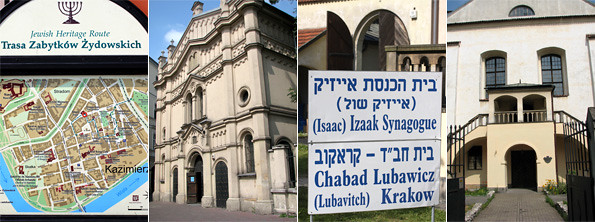


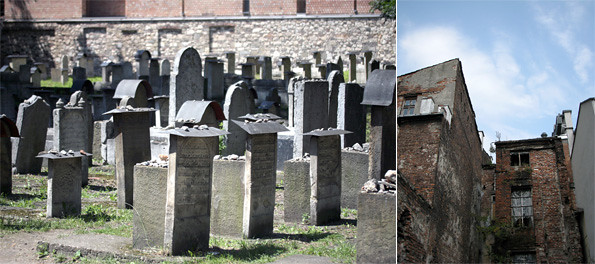
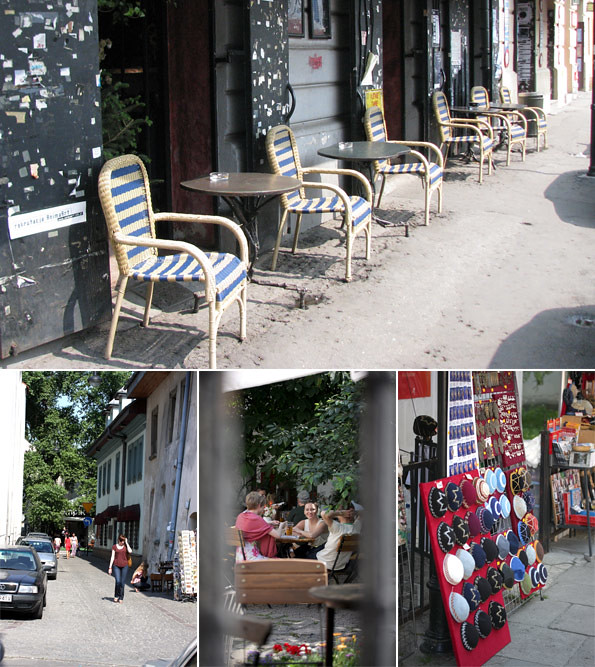
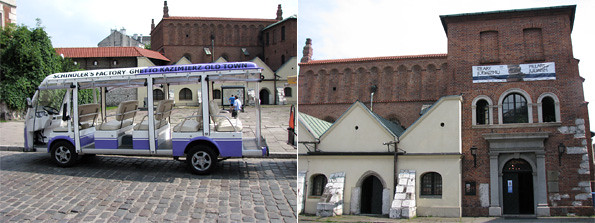
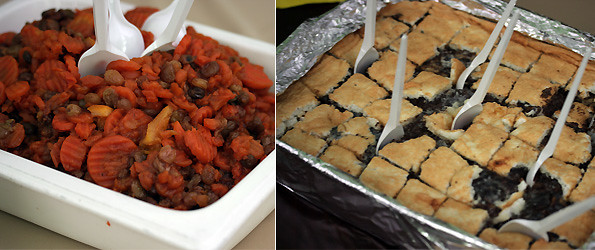
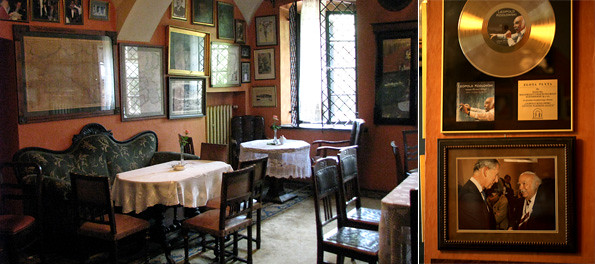


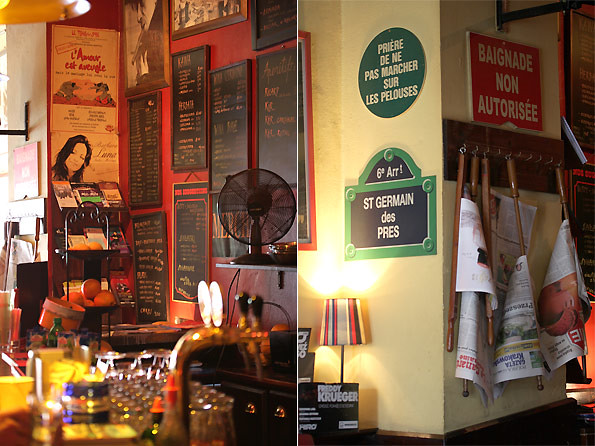
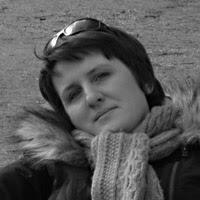






24 comments:
Przepiekny post Magda, przenosi w czasie, potrafisz uchwycic takie nieuchwytne wydawaloby sie klimaty. Z przyjemnoscia do ciebie za kazdym razem zagladam.
I have always been interested in this part of the world so I enjoyed reading your post and of course seeing the photographs. I wonder how does the government decide who owns the abandoned homes,maybe if everyone in the previous family is gone they should use them for schools, art museums or something for the benefit of the community, then maybe people would start to return to this area. I'm sorry the presentation of traditional Jewish food was weak and that there was not enough when most often there is too much on the table at meal time!
I know nothing about Jewish nor as Kosher food. However, I've learned about it from your post. Great informative and well-written post. I'm sorry you couldn't get kosher flour as you wanted. But, hey this seems like a cool event and there were different shops/cafes. I like the cheder cafe. Never been there but I like the feel of it and what they serve.
Hope the A/C will be available for you to cool off soon! Also, just found out you have a FB page so I just clicked like :D
What a beautiful post Mag, shared so evocatively. Loved being here...
This was a fascinating post! Well, as I would love to visit Krakow you have certainly given me some ideas about when to time my visit and where to eat. That's really too bad about the cooking demonstration; I would have been disappointed as well.
Very interesting post; in Beirut, the ancient Jewish neighborhood and synagogue are being rebuilt and renovated; it is in the heart of downtown Beirut. From someone who sees the Palestinian perspective, I am deeply sorry that the tragic uprooting of the Jewish community of Krakow has also been replayed here in the middle-east with the tragic uprooting of Palestinians, living in squalor in camps for 60 years to this day. My sincerest wish is for justice and peace to prevail the world over.
Last month, I got invited by my Jewish best friend to come with him to his son's Bar Mitzvah in Israel next year. Since then, my interest for Jewish culture has grown bigger. I usually spend hours reading their history, cuisine, and almost everything that defines their heritage. And I must say I can't wait to get to Israel.
Thanks to this post, Magdalena. I got to learn more about them, and also about Kraków. I should start looking for Jewish festivals nearby before our Israel Bar Mitzvah tours happen.
Oh, what a wonderful and informative post. Your photos are simply exquisite. Good use of your time since it's too hot to cook!
What a fascinating post. It carried with it compassion and a great sense of history. I loved your photos, but today your words were more meaningful to me. I hope this day treats you kindly. Blessings...Mary
Micc_coco: dziekuje i wzajemnie - wiesz, ze zawsze u Ciebie znajduje cos nowego i ciekawego!
The Poles and the Jews. "Two nations fed with the same suffering", as Antoni Slonimski, one of many Jewish-Polish poets, once put it. As a self-proclaimed goy master of challahs and bagels, and a person who has just had latkes (known simply as "placki ziemniaczane", potato pancakes in Polish) for his dinner I can surely attest to that. Not that Polish or Jewish food is in any way painful to experience, quite the contrary! It's just that we go back a long way.
Not wanting to disscus delicate issues of global politics of today, I wonder what if WWII and the Holocaust never happended? Would Poland still be the Jewish "Promised Land" in Europe? Would there not be the Palestinian-Israeli conflict? Just food for thought...
Loved this post Magdalena. I never knew Schindler's List was filmed in Poland. Wonderful movie. Jewish culture is so rich, these festivals are great. I would like to have the chance to visit one some day, learn more about the food and traditions
Magda
Great post very imformative. The only part of Poland i have been in is Gdansk and the northern parts around there. Never to Krakow but hopefully one day. I hope you have having a great vacation. I just moved and have to get back into blogging again, but moving has taken up most of my time this past few weeks.
That was so interesting. Thank you!
Magdo, jesteś prawdziwym ambasadorem Krakowa! Wspaniały post.
Pozdrawiam!
Hey Magdalena, just wondered where you were. So, I guess I stop by and say hi :)
Hello Tanatha; I was awfully busy and I reproach myself for not being very active on my blog. I should publish a new post tomorrow;
Thanks a lot for all your warm and constructive comments; I will answer asap!
O tak "mieszkancy ktorych nie ma"... Nie umiem opisac uczuc jakie mi towarzysza gdy odwiedzam tzw. zydowskie miasteczka bez Zydow. Jerozolima pozwolila mi poczuc jak to kiedys moglo byc... Niestety nie cofniemy czasu :(
W Krakowie tego tak nie czuc....najbardziej w malych galicyjskich, zapomnianych miasteczkach...
Na Kazimierzu tez jakos czuc, nie wiem czy w Bobowej, Dabrowie Tarnowskiej czy w Lezajsku bardziej... Zreszta to nie wazne gdzie bardziej, wazne ze.
no pewnie tak. mialam na myski to, ze te zydowskie zabytki w krakowie, kamienice, remontuja sie i tetnia zyciem, choc nie mieszkancow. a bylas w krakowie w takim malym muzeum (prywatnym) przy ul. dajwor (kolo bylej zajezdni tramwajowej). jest tam stala ekspozycja (albo byla - gdyz bylam tan w ubieglym roku) sladami malopolskich, galicyjskich Zydow...zdjecia zrujnowanych i zapomnianych cmetarzysk, synagog, kamienic. oraz przerazajace statystyki i liczby....
przepraszam za literowski - dziecko ciagnie mnie za reke :)
Nie bylam akurat w tym "muzeum", ale odzwiedzam miasteczka malopolski w ktych po ksztatach mozna rozpoznac dawne zydowskie budowle, straz pozarna, pikernia w synagodze... Rozumiem terz co piszesz myslac o Kazimierzu krakowskim...
Pozdrawiem Cie Magda!
Post a Comment